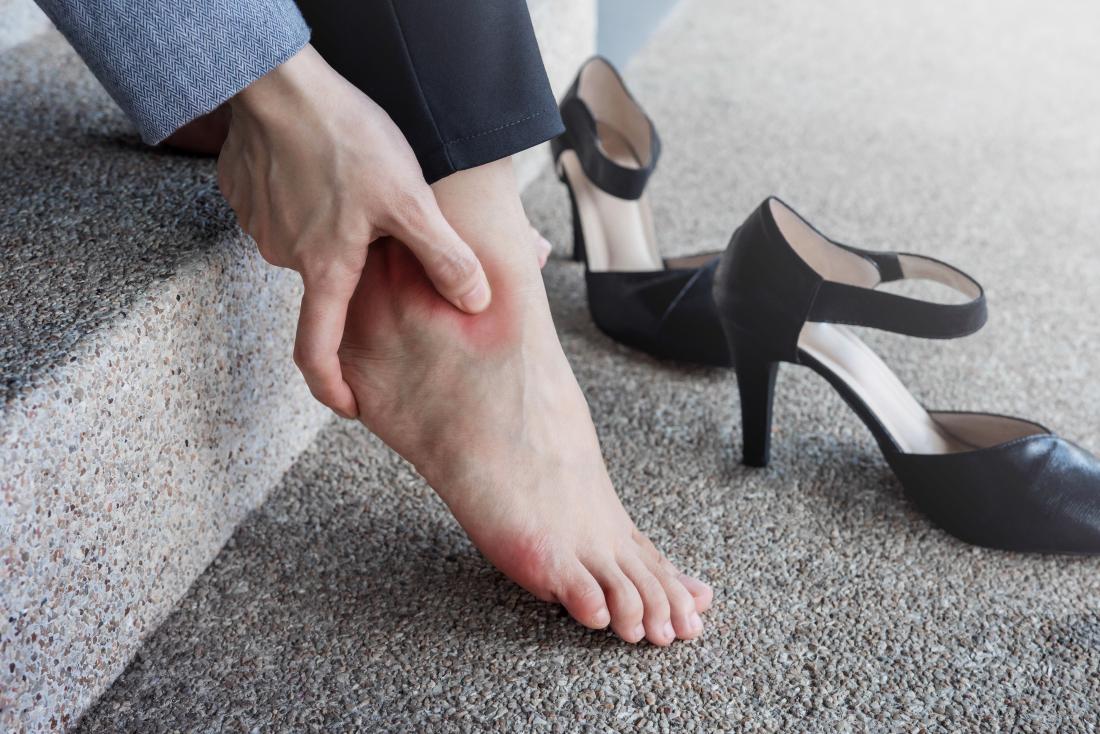Foot pain is not only a result of high impact activities such as jogging and hiking. It also occurs at the office where we sit for longer. Add ill-fitting shoes or high heels to the scenario, and you might be experiencing arch pain, heel pain or corns and callouses.
In an office environment, there are two main causes of foot pain:
Being sedentary
The human body is naturally meant to be upright, which is better for our breathing, our cardiovascular functions and our bowel movements. Sitting in chairs for short bursts is fine but sitting at office desks for many hours every day can affect your lower legs, ankles and feet. Fluid retention might occur along with slower circulation, leading to tingling, numbness, stiffness and a lack of oxygen and other healing nutrients being made available to your feet.
Incorrect footwear
Wearing heels, or footwear that is too narrow, too short or even too long can lead to forefoot pain, heel pain, bunions, corns and neuromas among other things. Incorrect footwear will make you change your walking style or gait to compensate for discomfort and this can lead to foot pain as well as ankle, knee and hip pain.
We are not against high heels in our clinics, but we do want our clients to be aware of the potential consequences and then take precautions to minimise foot pain, injury and future problems.
Common symptoms in the office
Poor circulation
Your circulation slows down when you are sitting for long periods of time. Less oxygen and other nutrients are delivered to your feet when you have poor circulation, creating temperature fluctuations and therefore cold feet. Poor circulation might also lead to infection or inflammatory conditions such as peripheral neuropathy- nerve damage that results in tingling sensations and numbness that can be painful.
Stiffness and swelling
Foot muscles can stiffen up and getting up suddenly to walk across to the coffee machine might cause cramping or exacerbate conditions such as plantar fasciitis. Fluid can build up in your feet and ankles when they are inactive. Sodium and water increase in the blood stream as a result and this makes the kidneys and lymphatic system work harder to eliminate fluid, which can lead to ongoing fluid retention.
Corns, calluses and bunions
A short walk from the bus or train to the office and back in high heels is enough to develop corns, callouses, bunions as well as hammer toes. These are all symptoms of footwear that is harmful to your feet. People will then compensate their gait to ease painful spots and this exacerbates the problem. Eventually you get stuck in a merry-go-round situation – your feet hurt, you change your gait to minimise the discomfort, this creates structural and alignment issues, sending more pain to your feet!
Nerve and ligament damage
High heels cause significant pressure to build up in the balls of your feet, causing neuromas, nerves and ligament damage. This can feel like numbness, tingling, or downright pain when you stand on a neuroma! The time it takes to heal this sort of condition depends on how long it has been occurring.
How a podiatrist helps with office related foot pain
Advice on general footcare
We will help you develop a great relationship with your feet, giving them enough attention and love that they will walk anywhere for you comfortably and happily! You don’t need to wait until you have foot pain to visit us.
At a preventive podiatry appointment, we’ll assess your gait and alignment, we’ll advise on how to deal with sore spots, blisters or corns and we’ll discuss footwear ideally suited to the shape of your foot. A little bit of foot-loving will take you a much longer way in life with healthy feet.
Fitting orthotics where necessary
If you have alignment problems that are causing pain, we may recommend orthoses to structurally support your feet for proper alignment. This will not only benefit your feet, but your ankles, your hips and spine as well. Orthoses are also available for high heels to redistribute the pressure of the foot across the shoe, not just the ball of the foot.
Recommending quality footwear
Shoes can make a huge difference to your overall sense of wellbeing. Our feet support our entire body and if they are sore, have you noticed that not only do our feet hurt but we get cranky and tired?
We’ll discuss your lifestyle and the sorts of shoes you need for your optimum foot health. We recommend natural fibres for shoes such as leather to allow the feet to breathe so that fungal infections are avoided.
Sanders podiatry clinics are in Adelaide, Stirling and Mount Barker
We have three family friendly podiatry clinics around Adelaide – Linden Park, Stirling and Mount Barker. Call us today to make an appointment for yourself, your children or parents, with our friendly and experienced podiatry team.
